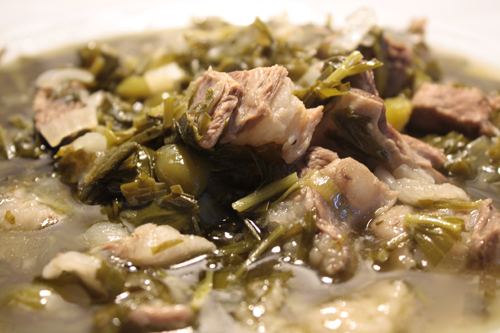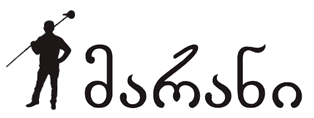
Remove fat off beef (tail fat in case of lamb), mince it and cook onions in this fat. Place one level of average-size diced meat in a pot and put herbs on top (all herbs need to be minced and mixed together). Continue like this to the end. No need to add water, as the herbs produce its own juice. Insert the lid over the pot and let it cook on a low heat. Cook it until herbs turn yellow. Stir only after that. When the meat is partially boiled, add white wine, tkemali (wild plums) with stones, and boil to the end. Add salt and pepper.
Ingredients:
Veil or mutton – 1 kg.
Tarragon – 150 g.
Watercress – 50 g.
Coriander – 100 g.
Celery – 20 g.
Laurel leaf – 2-3
Green onions – 100 g.
Onions – 2-3 head
Sorrel – 50 g.
New Tkemali (wild plums) – 0.5 teacup
Wine – 1 teacup
Salt and pepper as desired.
Version 2:
Prepare separately:
Meat layer – dice mutton into average slices, while the tail fat into small slices, but do not mince.
Herb layer – mince: coriander, celery, parsley, watercress, lots of tarragon, green onions, even celery and sorrel. Mix well.
Into the pot: one layer of meat, second layer of germs, third layer of several new sour plums, and repeat the cycle of meat, herbs and plums until all ingredients are used. Add water so that all layers are covered. Put the lid on and cook on a low heat. After it starts boiling, add salt and all of red peppers. Add white wine when the meat is half cooked.
Useful advise: It is better to add tarragon when the meat is half boiled. 3-4 leaves of mint also add good flavor to Chakapuli.
Ingredients:
Lamb – 1 kg.
Onions – 2-3 pieces
Tarragon – 150 g.
Coriander, parsley, and watercress – 50 g. each
Green onions – 100 g.
Celery – 20 g.
Sorrel – 20 g.
New tkemali (wild sour plums) – 250 g
White wine – 1 teacup
Salt and pepper as desired.
Interesting to know:
A sheep born in March is called a lamb in May-June, and Tokhli in fall, after the sheep is shaved. After a year, a female sheep is called Shishaki and she should become pregnant. Male sheep is called Tokl-Chedila. In August some of them will be castrated and will be referred to as Chedila, while those without castration are called Kochi. Kochis are selected based on body constitution and fur.
© Mzia Simonidze, Larisa Kirmelashvili / Wine Club






